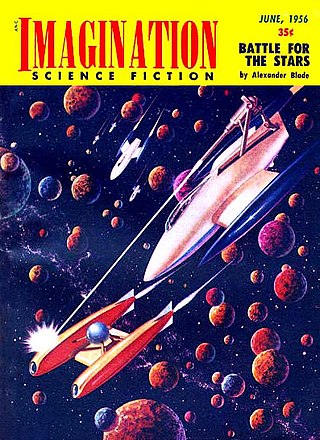
A fanzine is a non-professional and non-official publication produced by enthusiasts of a particular cultural phenomenon for the pleasure of others who share their interest. The term was coined in an October 1940 science fiction fanzine by Russ Chauvenet and first popularized within science fiction fandom, and from there the term was adopted by other communities.

Science fiction fandom or SF fandom is a community or fandom of people interested in science fiction in contact with one another based upon that interest. SF fandom has a life of its own, but not much in the way of formal organization.

A zine is a small-circulation self-published work of original or appropriated texts and images, usually reproduced via a copy machine. Zines are the product of either a single person or of a very small group, and are popularly photocopied into physical prints for circulation. A fanzine is a non-professional and non-official publication produced by enthusiasts of a particular cultural phenomenon for the pleasure of others who share their interest. The term was coined in an October 1940 science fiction fanzine by Russ Chauvenet and popularized within science fiction fandom, entering the Oxford English Dictionary in 1949.

A science-fiction fanzine is an amateur or semi-professional magazine published by members of science-fiction fandom, from the 1930s to the present day. They were one of the earliest forms of fanzine, within one of which the term "fanzine" was coined, and at one time constituted the primary type of science-fictional fannish activity ("fanac").
Mike Glyer is both the editor and publisher of the long-running science fiction fan newszine File 770. He has won the Hugo Award 12 times in two categories: File 770 won the Best Fanzine Hugo in 1984, 1985, 1989, 2000, 2001, 2008, 2016 and 2018. Glyer won the Best Fan Writer Hugo in 1984, 1986, 1988, and 2016. The 1982 World Science Fiction Convention (Worldcon) committee presented Glyer a special award in 1982 for "Keeping the Fan in Fanzine Publishing."
File 770 is a long-running science fiction fanzine, newszine, and blog site published/administered by Mike Glyer. It has been published every year since 1978, and has won a record eight Hugo Awards for Best Fanzine, with the first win in 1984 and the most recent in 2018.
Harry Warner Jr. was an American journalist. He spent 40 years working for the Hagerstown, Maryland, Herald-Mail.

Arthur Wilson "Bob" Tucker was an American author who became well known as a writer of mystery, action adventure, and science fiction under the name Wilson Tucker.
Fanspeak is the slang or jargon current in science fiction and fantasy fandom, especially those terms in use among readers and writers of science fiction fanzines.
SMOF is an acronym which stands for "Secret Master(s) Of Fandom" and is a term used within the science fiction fan community. Its coining is generally attributed to long-time science fiction fan and author Jack L. Chalker.
Fanac is a fan slang term for activities within the realm of science fiction fandom, and occasionally used in media fandom. It may be distinguished from fan labor in that "fanac" includes the publication of science fiction fanzines of the traditional kind, and the organization and maintenance of science fiction conventions and science fiction clubs.
MediaWest*Con is one of the largest and longest running media-based fan-run conventions in the United States. It is held annually over Memorial Day weekend in Lansing, Michigan. The convention emerged in the late 1970s, beginning as T'Con in 1978 and 2'Con in 1979 before taking on the name MediaWest*Con in 1981. The convention remains the world's largest gathering of Fanzine writers, artists, and publishers, and for decades was the event where most new science fiction and fantasy Fanzines were released. The annual "Fan Quality Awards" for Fanzine excellence, known as the "Fan Q's", have been given out at MediaWest*Con since 1981. In addition, the convention's art show has been the principal location for the display and sale of published Fanzine art and illustrations.

VCON is a fan run fantasy, gaming, and science fiction convention held annually in the metro Vancouver area of British Columbia, Canada. It has been hosted by the West Coast Science Fiction Association (WCSFA) since 1993, and by the Western Canadian Science Fiction Convention Committee Association (WCSFCCA) before that.
Nova Express was a Hugo-nominated science fiction fanzine edited by Lawrence Person. Nova Express is named after William S. Burroughs' Nova Express and the fictional magazine Nova Express in Alan Moore's Watchmen. It remained in publication between 1987 and 2002.
Greg Pickersgill, is a British science fiction fan.
The Birmingham Science Fiction Group (BSFG), also known as the "Brum Group", held its first meeting on 25 June 1971. It runs regular meetings in Birmingham, England, where SF fans can meet one another and professionals in the field in a friendly environment, and has organised the annual SF convention Novacon since 1972.

Earl Kemp was an American publisher, science fiction editor, critic, and fan who won a Hugo Award for Best Fanzine in 1961 for Who Killed Science Fiction, a collection of questions and answers with top writers in the field. Kemp also helped found Advent:Publishers, a small publishing house focused on science fiction criticism, history, and bibliography, and served as chairman of the 20th World Science Fiction Convention. During the 1960s and '70s, Kemp was also involved in publishing a number of erotic paperbacks, including an illustrated edition of the Presidential Report of the Commission on Obscenity and Pornography. This publication led to Kemp being sentenced to one year in prison for "conspiracy to mail obscene material," but he served only the federal minimum of three months and one day.
John Bangsund was an Australian science fiction fan in the 1960s, 1970s, and 1980s. He was a major force, with Andrew I. Porter, behind Australia winning the right to host the 1975 Aussiecon, and he was Toastmaster at the Hugo Award ceremony at that convention.
The Ditmar Award has been awarded annually since 1969 at the Australian National Science Fiction Convention to recognise achievement in Australian science fiction and science fiction fandom. The award is similar to the Hugo Award but on a national rather than international scale.

Space opera is a subgenre of science fiction that emphasizes space warfare, with use of melodramatic, risk-taking space adventures, relationships, and chivalric romance. Set mainly or entirely in outer space, it features technological and social advancements in faster-than-light travel, futuristic weapons, and sophisticated technology, on a backdrop of galactic empires and interstellar wars with fictional aliens, often in fictional galaxies. The term has no relation to opera music, but is instead a play on the terms "soap opera", a melodramatic television series, and "horse opera", which was coined during the 1930s to indicate a clichéd and formulaic Western film. Space operas emerged in the 1930s and continue to be produced in literature, film, comics, television, video games and board games.






